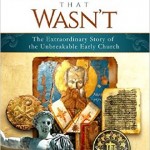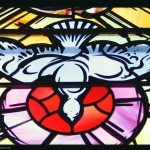Two weeks ago I wrote briefly about how I came to be the Catholic I am now; and last week I wrote about objective reasons why I believe Christianity to be plausibly true. Some didn’t find them convincing, which doesn’t surprise me at all. Outside of mathematics, there’s no argument so flawlessly reasoned that it will inevitably and necessarily convince everyone—not that I lay claim to explaining these things flawlessly. Emile Zola famously examined all of the evidence for one the miraculous healings at Lourdes, determined that it was conclusive, and yet still refused to accept the healing as miraculous. It is tremendously hard to overcome one’s presuppositions, and often wise not to on the spur of the moment. Such things take contemplation.
Be that as it may, while I’m not convincing everyone I thought I should continue the theme and explain why I returned the Catholic Church: why I believe Catholicism to be the truest expression of Christ’s body in this world, and the Church actually established by Christ himself.
So…non-Christian readers, feel free to read this if it interests you, but I’m not going to be speaking to your concerns today. Non-Catholic Christians, this should all be non-controversial, in the sense that as a man who left Protestantism for Catholicism, it’s just what I would believe; if I didn’t, I’d never have done that. Also, be aware that I am not accusing non-Catholic Christians of not being real Christians.
OK; everybody clear on that?
For me, it all comes down to this phrase in the Nicene Creed: “one holy catholic and apostolic church”. Note the small “c” in “catholic”; I’ll get to that. This phrase is the source of what are called the four “marks” of the Church.
First, the Church is to be “one”. In Christ’s high priestly prayer in the Gospel of John, he prays at length for the unity of his followers. The Church, St. Paul tells us, is the Body of Christ. Jesus himself says that he is the vine, and we are the branches. If you cut a limb from either a body or a vine, it dies.
The Church is to be “holy”, set apart for God; and should encourage holiness in its members.
The Church is to be “catholic”, which means “universal”; it is meant to include all of the followers of Christ, wherever and whenever they might live.
And finally, it is to be apostolic, handing down today what the Jesus gave his Apostles, and they in turn gave their successors.
Where do we see these things in the world of Christianity today? Our current era in which there are many distinct flavors of Christianity clearly fails to be as Christ wished; the whole body of Christ as it exists in the world today is neither “one” nor “catholic”. But note that a body has many members, and they look different. “One” and “catholic” taken together imply a kind of unity-in-diversity. Where is this most evident today, not just in concept but in actuality?
Let me start with the last mark of the Church: that it must be “apostolic”.
The Protestant denominations have mostly abandoned the Apostolic Succession, which is a principle found very clearly in the earliest fathers of the church (St. Ignatius of Antioch). Catholic bishops claim ordination by earlier bishops and so on back to the apostles. There’s good historical evidence for this; and I’ll note that the mass and sacraments we celebrate in the Catholic Church today are to found in some of the earliest Christian writings, and particularly in Justin Martyr’s Apology to the emperor of Rome. I remember reading Justin as an Anglican and being distressed that the mass I found in his pages was the mass that I’d grown up with; it meant that I was in the wrong place, which was a conclusion I was not prepared to deal with.
The Catholic Church is not the only Apostolic church in the world. The Eastern Orthodox churches have the Apostolic succession, and I gather that the Armenian Apostolic and Coptic churches do as well (though they have other issues). When we began to consider leaving the Episcopal Church, Jane and I looked at the Eastern Orthodox churches precisely because they are apostolic and have valid sacraments; and the Orthodox Church in America, in particular, has welcomed many from Episcopalianism.
But then there is unity and universality (i.e., catholicity). The Orthodox churches are generally tied to particular language groups and ethnicities. They have not generally sought to expand into new regions, except to serve their own expatriates. And yet Jesus commanded us, as his last words on Earth, to go and make disciples of all of nations. Many Protestant communities take that commandment seriously. But of the Churches with the apostolic succession, only the Catholic Church has expanded to every continent of the globe, to every nation, to serve and disciple the people she finds there.
Anglicans may take issue with this; and certainly, there are Anglican churches all over the former Anglican communion. Some of the Anglican Churches in the Global South our immense, vibrant, and growing. But the Apostolic Succession was broken in Anglicanism at the time of the Reformation, and though attempts were at one point made to restore it, it can’t be taken for granted.
As for unity—numbers prove nothing, and yet I find it suggestive that Catholic Church is the largest Christian body in the world, and contains people of every race in every country.
As for holiness: I know of no Christian tradition that surpasses the riches the Catholic Church has for those who truly wish to grow in holiness (though the Eastern Orthodox churches are comparable). And since holiness is one of the things that Jesus asks of us, that’s a very good thing.
In my view then, the Catholic Church (with its thirty-odd component churches, of which the Roman Catholic Church is only one) best typifies the unity-in-diversity we should expect to see in the Body of Christ; it is Apostolic, teaching the faith received from the apostles and passed down through the apostolic succession; and it excels at discipling its members in holiness (at least, those who seek to be so discipled). And as such, it gets my vote.











